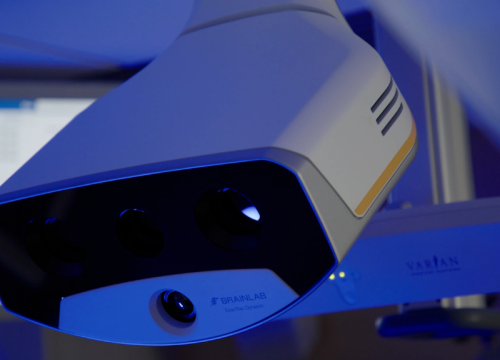If you have been diagnosed with breast cancer, Valley’s Breast Center team is here for you. Valley provides the full spectrum of breast health services, from diagnosis and treatment to survivorship.
If you have had an abnormal mammogram or have been diagnosed with breast cancer, Valley’s Breast Center will see you quickly for an initial visit. We will walk you through what to expect and your next steps.
Types of Breast Cancer
At the Valley Breast Center, we treat all types of breast cancer and breast diseases, including:
- Breast Cancer and Pregnancy
- Invasive Ductal Carcinoma
- Invasive Lobular Carcinoma
- Invasive Mammary Carcinoma
- Hormone-Receptor Positive Breast Cancer
- Triple-Negative Breast Cancer
- HER2-Positive Breast Cancer
- Ductal Carcinoma in Situ (DCIS)
- Metastatic Breast Cancer
- Atypical Ductal Hyperplasia (Atypia)
- Atypical Lobular Hyperplasia (Atypia)
- Lobular Carcinoma in Situ (LCIS)
- Phyllodes Tumor
- Fibroadenoma
- Papillary Disease
- Radial Scar (Complex Sclerosing Lesion)
Breast Cancer Symptoms
Most breast cancers are diagnosed by an annual screening mammogram. The following are also some of the signs of breast disease.
If you notice any of these breast cancer symptoms, schedule a visit with your primary care provider:
- Breast lump or thickening
- Bloody nipple discharge
- Changes in breast size or shape
- Changes to the skin over the breast, such as dimpling, redness or pitting
- Peeling, scaling or flaking of the nipple or skin
- Newly inverted nipple
Care for Patients at High Risk for Breast Cancer
Being at high risk for breast cancer does not mean you will develop breast cancer. “High risk” means you:
- Carry a genetic marker, such as the BRCA1 or BRCA2 gene
- Have a family history of breast cancer (among first-degree relatives, such as your parent, child or sibling; or second-degree relatives, such as your grandparent, aunt or uncle, or niece or nephew)
- Have a particular finding on breast biopsy that can increase the possibility of developing breast cancer
- History of having received mantle-field radiation (radiation to the lymph node areas in the neck, chest and under the arms) for lymphoma
If you are at high risk for breast cancer, our breast cancer team will work with you to develop a comprehensive, individualized surveillance plan to help manage your risk.
We will also help you learn how to make changes to behaviors that may contribute to your risk, such as your diet or or other lifestyle choices.
Breast Cancer Screening and Diagnosis at Valley
Screening
Valley’s Breast Imaging Center provides imaging tests to screen for breast cancer:
- Screening 3D mammograms (tomosynthesis)
- Breast ultrasound
- Breast MRI
Diagnosis
If breast cancer is suspected following your screening mammogram, you will need a diagnostic workup. A diagnostic workup includes the additional imaging and possible biopsy needed to come to a diagnosis.
There are different types of breast biopsies (e.g., stereotactic breast biopsy, core biopsy or fine-needle aspiration), in which a sample of breast tissue is removed. At Valley, your breast tissue is examined by a pathologist with expertise in breast cancer to confirm or rule out cancer.
Breast Center Navigators
- If you have an abnormal mammogram, our breast patient navigator will help coordinate any additional tests that are needed.
- If you receive a diagnosis of breast cancer, you will transition to working with our nurse navigator. Our breast nurse navigator will coordinate your visit with a breast surgeon.
- The breast nurse navigator will also help coordinate your appointments with the rest of the breast cancer physicians. The nurse navigator will connect you to cancer support services as needed.
Breast Cancer Treatment at Valley
First, we want to understand your type of breast cancer, the extent of your disease and incorporate genomic testing wherever it applies. We then work as a team to create a comprehensive treatment plan that takes into account these findings, plus your treatment goals. We also offer the option for fertility preservation.
Typically, your breast cancer treatment at Valley will involve the following:
Breast Cancer Surgery
At Valley, breast surgeons use advanced oncoplastic techniques that combine traditional cancer surgery with established plastic surgery practices. This innovative approach allows for superior cosmetic results.
Valley offers patients the most advanced options for breast reconstruction and breast procedures, including:
- Breast-preserving lumpectomy
- Breast seed localization, a better way to precisely pinpoint small breast tumors or abnormal breast tissue as well as being a patient-friendly approach
- Nipple-sparing mastectomy
- Immediate reconstruction following mastectomy
- Oncoplastic surgery team for optimal cosmetic results
Chemotherapy and Targeted Therapy
Based on your cancer stage and characteristics, you may require chemotherapy and/or targeted therapy. When applicable, we use genomic testing to analyze your tumor and aid us in making treatment decisions.
We will recommend what type of chemotherapy and/or targeted therapy (including immunotherapy) would work best for your type of cancer.
Chemotherapy and/or targeted therapy may be recommended at different times in your treatment to give you the best possible outcome. Often, we recommend having chemotherapy after surgery to target any cells that may remain after surgery. For some people, we may recommend chemotherapy before surgery (known as neoadjavent chemotherapy) to shrink the tumor and make it easier to remove.
Our medical oncologists at Valley will guide you through potential options to match your type of breast cancer, including:
- Clinical trials of potential new therapy options
- Chemotherapy, immunotherapy and/or hormone therapy specific to your hormone receptor status (e.g., estrogen receptor positive or triple negative breast cancer)
- Genetic testing and risk-reduction strategies for high-risk patients
- Echocardiograms to monitor the effects on your heart prior to and during chemotherapy through our Cardio-Oncology Program
- Fertility preservation and family planning services for young women
- Complementary therapies to improve your quality of life during chemo, such as supervised exercise and nutrition
Breast Radiation Therapy
Our radiation goals are always to provide the most effective dose of radiation possible while minimizing radiation exposure to healthy tissues and organs. For breast cancers in the left breast, we pay particular attention to exposure to your heart and lungs.
Valley’s radiation oncology team offers the latest evidence-based techniques and radiation therapies that account for the smallest movements (such as during breathing). These include the following:
- Next generation radiation therapy options, including TrueBeam and ExacTrac Dynamic by Brainlab: targets cancer cells while sparing surrounding healthy cells; ExacTrac offers the greatest level of precision available among current radiation technology
- Accelerated, or hypofractionated, radiation therapy: offers comparable outcomes in three to four weeks of radiation, instead of the usual six to seven weeks
- Heart-protecting techniques: including prone-breast treatment and deep inspiration breath hold (DIBH); with DIBH, radiation is delivered only while you are holding your breath and your heart has moved away from your breast
Survivorship Planning
Survivorship begins on the day of diagnosis, although you may receive treatment for your cancer over a long period of time. In addition to health issues, cancer survivors face mental health, reproductive, social, employment, financial concerns and more.
At Valley, we created a program dedicated to your survivorship needs. Once you finish active treatment, you will continue to visit us through our survivorship program for ongoing surveillance.
Why Choose Valley for Breast Cancer?
- We’ll see you quickly: We know that when you have an abnormal mammogram or a confirmed breast cancer diagnosis, you want answers right away. Our breast cancer surgeons can meet with you within one to three days of your call.
- Patient-focused breast cancer experts close to home: The Valley Breast Center has breast cancer-trained experts — from breast imaging through treatment — who always put your goals and treatment needs first. At Valley, you have all the advanced breast cancer options that are available at larger institutions — close to where you live and work.
- Oncoplastic techniques for breast surgery: Our breast surgeons use advanced oncoplastic techniques that combine traditional breast cancer surgery with plastic surgery. We plan your lumpectomy or mastectomy surgery with survivorship in mind. With oncoplastic techniques, our breast surgeons can provide better cosmetic results while they meet your medical needs.
- Radiation therapy precision: Our advanced options include highly precise radiation therapy through TrueBeam and ExacTrac Dynamic. ExacTrac Dynamic uses 300,000 external markers (10 times the typical system) plus internal, thermal imaging. This combination gives our radiation therapists the most precise guidance possible to target your tumor and minimize radiation exposure to healthy tissues.
- Triple-negative breast cancer and other complex cases: Our team has expertise in treating all breast cancers, including triple negative and metastatic breast cancer.
- Breast cancer clinical trials: We have a robust breast cancer clinical trials program and use genomic and molecular testing to guide treatment.
- Accredited breast center: Valley is accredited by the National Accreditation Program for Breast Centers (NAPBC), a program of the American College of Surgeons. Valley has been NAPBC-accredited since 2011.

















